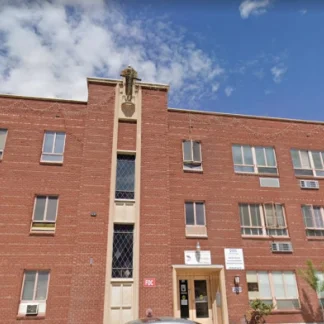Sovereign Health
Sovereign Health provides mental health and substance abuse services for adults ...
Recovery Alliance of El Paso–Casa Vida de Salud is a 12 step-focused drug and alcohol rehab for adults. They offer inpatient treatment and aftercare planning and support, including specialized programming for young adults and persons with co-occurring addiction and mental illness.
Recovery Alliance of El Paso–Casa Vida de Salud, in El Paso, Texas provides 12 step-focused addiction recovery services for adults. Dedicated programming for young adults and persons with co-occurring addiction and mental illness is available.
The inpatient program allows clients to focus on their recovery in a highly supportive, home-like environment with premium amenities, including onsite recreational facilities. Clients receive medical and mental health assessments, personalized care plans, and comprehensive case management. They also engage in intensive individual, group, and family counseling. Recovery-focused life skills training is prioritized to promote clients’ long-term recovery, including courses in self-care, coping, wellness, anger and stress management, and relapse prevention.
Recovery Alliance of El Paso–Casa Vida de Salud facilitates clients’ successful reintegration into their home, workplace, and community through robust wraparound care. Services may include peer coaching, career counseling, 12 step program induction, transitional support, and referrals for medical, mental health, and social service programs.
Recovery Alliance of El Paso–Casa Vida de Salud is state licensed. They accept private insurance, Medicare, and self-pay.
Contact us for more information: (915) 594-7000

Connect with Recovery Alliance of El Paso - Casa Vida de Salud by calling their admissions team directly.
(915) 594-7000 Website Get DirectionsState Licenses are permits issued by government agencies that allow rehab organizations to conduct business legally within a certain geographical area. Typically, the kind of program a rehab facility offers, along with its physical location, determines which licenses are required to operate legally.
State License: Texas License Number: 4002
Research clearly demonstrates that recovery is far more successful and sustainable when loved ones like family members participate in rehab and substance abuse treatment. Genetic factors may be at play when it comes to drug and alcohol addiction, as well as mental health issues. Family dynamics often play a critical role in addiction triggers, and if properly educated, family members can be a strong source of support when it comes to rehabilitation.
Group therapy is any therapeutic work that happens in a group (not one-on-one). There are a number of different group therapy modalities, including support groups, experiential therapy, psycho-education, and more. Group therapy involves treatment as well as processing interaction between group members.
In individual therapy, a patient meets one-on-one with a trained psychologist or counselor. Therapy is a pivotal part of effective substance abuse treatment, as it often covers root causes of addiction, including challenges faced by the patient in their social, family, and work/school life.
Recreational therapy (aka therapeutic recreation) uses creative and fun activities to help with addiction recovery. Recreational therapists lead patients in entertaining and engaging activities like sports or games; art (drawing, painting, sculpture); drama, music, and dance; and/or community outings (field trips) to improve patients' physical, social, and emotional well-being.
Group therapy is any therapeutic work that happens in a group (not one-on-one). There are a number of different group therapy modalities, including support groups, experiential therapy, psycho-education, and more. Group therapy involves treatment as well as processing interaction between group members.
In individual therapy, a patient meets one-on-one with a trained psychologist or counselor. Therapy is a pivotal part of effective substance abuse treatment, as it often covers root causes of addiction, including challenges faced by the patient in their social, family, and work/school life.
Recreational therapy (aka therapeutic recreation) uses creative and fun activities to help with addiction recovery. Recreational therapists lead patients in entertaining and engaging activities like sports or games; art (drawing, painting, sculpture); drama, music, and dance; and/or community outings (field trips) to improve patients' physical, social, and emotional well-being.
In individual therapy, a patient meets one-on-one with a trained psychologist or counselor. Therapy is a pivotal part of effective substance abuse treatment, as it often covers root causes of addiction, including challenges faced by the patient in their social, family, and work/school life.
Recreational therapy (aka therapeutic recreation) uses creative and fun activities to help with addiction recovery. Recreational therapists lead patients in entertaining and engaging activities like sports or games; art (drawing, painting, sculpture); drama, music, and dance; and/or community outings (field trips) to improve patients' physical, social, and emotional well-being.
Recreational therapy (aka therapeutic recreation) uses creative and fun activities to help with addiction recovery. Recreational therapists lead patients in entertaining and engaging activities like sports or games; art (drawing, painting, sculpture); drama, music, and dance; and/or community outings (field trips) to improve patients' physical, social, and emotional well-being.
Sovereign Health provides mental health and substance abuse services for adults ...
AA – Alcoholics Anonymous is a non-profit rehab located in El Paso, Texas. AA – ...
Ministerio En Victoria is a non-profit rehab located in El Paso, Texas. Minister...
El Paso VA Health Care System - Medical Center is a public rehab located in El P...